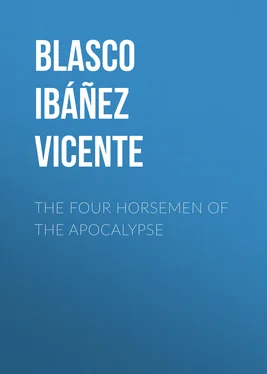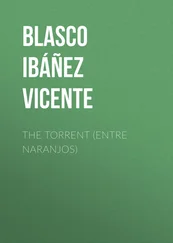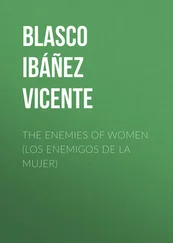Vicente Blasco Ibáñez - The Four Horsemen of the Apocalypse
Здесь есть возможность читать онлайн «Vicente Blasco Ibáñez - The Four Horsemen of the Apocalypse» — ознакомительный отрывок электронной книги совершенно бесплатно, а после прочтения отрывка купить полную версию. В некоторых случаях можно слушать аудио, скачать через торрент в формате fb2 и присутствует краткое содержание. Жанр: foreign_prose, foreign_antique, на английском языке. Описание произведения, (предисловие) а так же отзывы посетителей доступны на портале библиотеки ЛибКат.
- Название:The Four Horsemen of the Apocalypse
- Автор:
- Жанр:
- Год:неизвестен
- ISBN:нет данных
- Рейтинг книги:3 / 5. Голосов: 1
-
Избранное:Добавить в избранное
- Отзывы:
-
Ваша оценка:
- 60
- 1
- 2
- 3
- 4
- 5
The Four Horsemen of the Apocalypse: краткое содержание, описание и аннотация
Предлагаем к чтению аннотацию, описание, краткое содержание или предисловие (зависит от того, что написал сам автор книги «The Four Horsemen of the Apocalypse»). Если вы не нашли необходимую информацию о книге — напишите в комментариях, мы постараемся отыскать её.
The Four Horsemen of the Apocalypse — читать онлайн ознакомительный отрывок
Ниже представлен текст книги, разбитый по страницам. Система сохранения места последней прочитанной страницы, позволяет с удобством читать онлайн бесплатно книгу «The Four Horsemen of the Apocalypse», без необходимости каждый раз заново искать на чём Вы остановились. Поставьте закладку, и сможете в любой момент перейти на страницу, на которой закончили чтение.
Интервал:
Закладка:
In the midst of the fine and elegant South American ladies who looked as if they had just escaped from a fashion sheet, her eyes sought other women, not so well dressed, fat, with theatrical ermine and antique jewelry. When these high-born dames met each other in the vestibule, they spoke with heavy voices and expressive gestures, emphasizing their words energetically. The daughter of the ranch ventured to salute them because she had subscribed to all their pet charities, and upon seeing her greeting returned, she felt a satisfaction which made her momentarily forget her woes. They belonged to those families which her father had so greatly admired without knowing why. They came from the “mother country,” and to the good Chicha were all Excelentisimas or Altisimas, related to kings. She did not know whether to give them her hand or bend the knee, as she had vaguely heard was the custom at court. But soon she recalled her preoccupation and went forward to wrestle in prayer with God. Ay, that he would mercifully remember her! That he would not long forget her son! . . .
It was Glory that remembered Julio, stretching out to him her arms of light, so that he suddenly awoke to find himself surrounded by all the honors and advantages of celebrity. Fame cunningly surprises mankind on the most crooked and unexpected of roads. Neither the painting of souls nor a fitful existence full of extravagant love affairs and complicated duels had brought Desnoyers this renown. It was Glory that put him on his feet.
A new pleasure for the delight of humanity had come from the other side of the seas. People were asking one another in the mysterious tones of the initiated who wish to recognize a familiar spirit, “Do you know how to tango? . . .” The tango had taken possession of the world. It was the heroic hymn of a humanity that was suddenly concentrating its aspirations on the harmonious rhythm of the thigh joints, measuring its intelligence by the agility of its feet. An incoherent and monotonous music of African inspiration was satisfying the artistic ideals of a society that required nothing better. The world was dancing . . . dancing . . . dancing.
A negro dance from Cuba introduced into South America by mariners who shipped jerked beef to the Antilles, conquered the entire earth in a few months, completely encircling it, bounding victoriously from nation to nation . . . like the Marseillaise. It was even penetrating into the most ceremonious courts, overturning all traditions of conservation and etiquette like a song of the Revolution—the revolution of frivolity. The Pope even had to become a master of the dance, recommending the “Furlana” instead of the “Tango,” since all the Christian world, regardless of sects, was united in the common desire to agitate its feet with the tireless frenzy of the “possessed” of the Middle Ages.
Julio Desnoyers, upon meeting this dance of his childhood in full swing in Paris, devoted himself to it with the confidence that an old love inspires. Who could have foretold that when as a student, he was frequenting the lowest dance halls in Buenos Aires, watched by the police, that he was really serving an apprenticeship to Glory? . . .
From five to seven, in the salons of the Champs d’Elysees where it cost five francs for a cup of tea and the privilege of joining in the sacred dance, hundreds of eyes followed him with admiration. “He has the key,” said the women, appraising his slender elegance, medium stature, and muscular springs. And he, in abbreviated jacket and expansive shirt bosom, with his small, girlish feet encased in high-heeled patent leathers with white tops, danced gravely, thoughtfully, silently, like a mathematician working out a problem, under the lights that shed bluish tones upon his plastered, glossy locks. Ladies asked to be presented to him in the sweet hope that their friends might envy them when they beheld them in the arms of the master. Invitations simply rained upon Julio. The most exclusive salons were thrown open to him so that every afternoon he made a dozen new acquaintances. The fashion had brought over professors from the other side of the sea, compatriots from the slums of Buenos Aires, haughty and confused at being applauded like famous lecturers or tenors; but Julio triumphed over these vulgarians who danced for money, and the incidents of his former life were considered by the women as deeds of romantic gallantry.
“You are killing yourself,” Argensola would say. “You are dancing too much.”
The glory of his friend and master was only making more trouble for him. His placid readings before the fire were now subject to daily interruptions. It was impossible to read more than a chapter. The celebrated man was continually ordering him to betake himself to the street. “A new lesson,” sighed the parasite. And when he was alone in the studio numerous callers—all women, some inquisitive and aggressive, others sad, with a deserted air—were constantly interrupting his thoughtful pursuits.
One of them terrified the occupants of the studio with her insistence. She was a North American of uncertain age, somewhere between thirty-two and fifty-nine, with short skirts that whenever she sat down, seemed to fly up as if moved by a spring. Various dances with Desnoyers and a visit to the rue de la Pompe she seemed to consider as her sacred rights, and she pursued the master with the desperation of an abandoned zealot. Julio had made good his escape upon learning that this beauty of youthful elegance—when seen from the back—had two grandchildren. “MASTER Desnoyers has gone out,” Argensola would invariably say upon receiving her. And, thereupon she would burst into tears and threats, longing to kill herself then and there that her corpse might frighten away those other women who would come to rob her of what she considered her special privilege. Now it was Argensola who sped his companion to the street when he wished to be alone. He had only to remark casually, “I believe that Yankee is coming,” and the great man would beat a hasty retreat, oftentimes in his desperate flight availing himself of the back stairs.
At this time began to develop the most important event in Julio’s existence. The Desnoyers family was to be united with that of Senator Lacour. Rene, his only son, had succeeded in awakening in Chichi a certain interest that was almost love. The dignitary enjoyed thinking of his son allied to the boundless plains and immense herds whose description always affected him like a marvellous tale. He was a widower, but he enjoyed giving at his home famous banquets and parties. Every new celebrity immediately suggested to him the idea of giving a dinner. No illustrious person passing through Paris, polar explorer or famous singer, could escape being exhibited in the dining room of Lacour. The son of Desnoyers—at whom he had scarcely glanced before—now inspired him with sudden interest. The senator was a thoroughly up-to-date man who did not classify glory nor distinguish reputations. It was enough for him that a name should be on everybody’s lips for him to accept it with enthusiasm. When Julio responded to his invitation, he presented him with pride to his friends, and came very near to calling him “dear master.” The tango was monopolizing all conversation nowadays. Even in the Academy they were taking it up in order to demonstrate that the youth of ancient Athens had diverted itself in a somewhat similar way. . . . And Lacour had dreamed all his life of an Athenian republic.
At these reunions, Desnoyers became acquainted with the Lauriers. He was an engineer who owned a motor-factory for automobiles in the outskirts of Paris—a man about thirty-five, tall, rather heavy and silent, with a deliberate air as though he wished to see deeply into men and things. She was of a light, frivolous character, loving life for the satisfactions and pleasures which it brought her, appearing to accept with smiling conformity the silent and grave adoration of her husband. She could not well do less with a man of his merits. Besides, she had brought to the marriage a dowry of three hundred thousand francs, a capital which had enabled the engineer to enlarge his business. The senator had been instrumental in arranging this marriage. He was interested in Laurier because he was the son of an old friend.
Читать дальшеИнтервал:
Закладка:
Похожие книги на «The Four Horsemen of the Apocalypse»
Представляем Вашему вниманию похожие книги на «The Four Horsemen of the Apocalypse» списком для выбора. Мы отобрали схожую по названию и смыслу литературу в надежде предоставить читателям больше вариантов отыскать новые, интересные, ещё непрочитанные произведения.
Обсуждение, отзывы о книге «The Four Horsemen of the Apocalypse» и просто собственные мнения читателей. Оставьте ваши комментарии, напишите, что Вы думаете о произведении, его смысле или главных героях. Укажите что конкретно понравилось, а что нет, и почему Вы так считаете.











